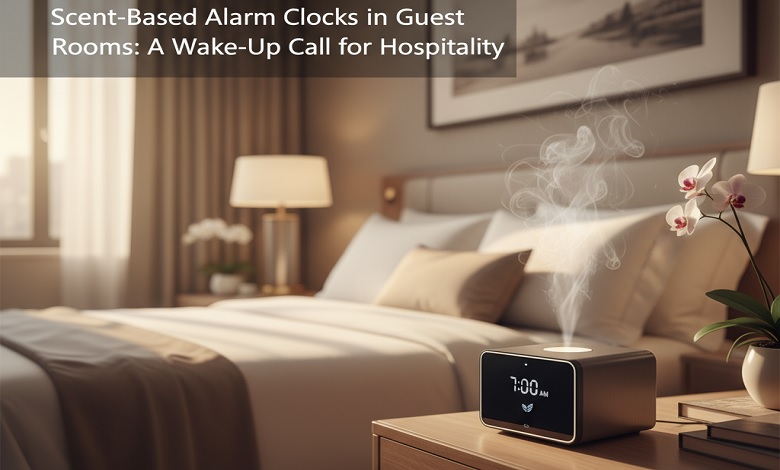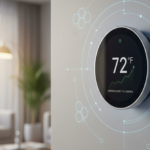When people check into hotels, they expect comfort: a good bed, clean room, friendly service. But lately, hospitality brands are experimenting with something more sensory—scent-based alarm clocks—devices that wake guests not with blaring rings, but with pleasant aromas. These clock-diffuser hybrids are catching attention in 2025 as an innovative way to improve guest experience. Let’s explore why they matter, how they compare, what to watch out for, and which products are leading the pack.
🧠 Why Aroma Wakes & What Guests Want
Many travelers report that standard alarms are jarring and stress-inducing. A survey by IHG (Holiday Inn Express) in the Asia Pacific region found that 58% of travelers say a pleasant smell helps them feel better in the morning, especially when away from home. Hospitality Net+2The Adept Traveler+2
Hotels see this as an opportunity: waking guests gently can improve mood, reduce complaints about noisy alarms, and even encourage guests to make it to breakfast. Holiday Inn Express is pioneering a “Breakfast Alarm Clock” that lets guests choose scents like coffee, bacon, blueberry muffin, or regional fruit (mango, nashi pear) instead of sound. The Adept Traveler+2New York Post+2
✅ What Features Make a Good Scent-Based Alarm Clock
Here are the features that distinguish useful, guest-friendly designs from gimmicks:
-
Multiple scent options & quality capsules: Scents should be pleasant, non-overpowering, hypoallergenic if possible. Capsules or cartridges should be replaceable and available.
-
Gradual wake process: Many devices use a multi-stage wake: first scent, then light, then (if needed) sound. This reduces shock and improves guest satisfaction.
-
Choice & localization: Guests appreciate choosing their wake-up smell. Hotels offering local scents (fruity, bakery, etc.) tend to do better. Holiday Inn’s scent sets change by country so scents feel familiar. The Adept Traveler+1
-
Timer, volume, intensity controls: The device should allow guests to adjust or turn off scent, light, or sound. Not everyone wants breakfast smells flooding their room.
-
Hygiene & maintenance: Diffuser cartridges need replacement; aroma strength & cleanliness matter. Housekeeping workflows must support that.
⚠️ Pitfalls / What Hotels Should Watch Out For
-
Guest allergies & sensitivities: Some may be allergic or irritated by scent. Overuse or strong scents can lead to negative feedback, headaches, or discomfort.
-
Operational cost & logistics: Replacing scent cartridges, cleaning diffusers, training staff—it all adds cost. Also sourcing different scents for different regions complicates inventory.
-
Scent leakage / disturbance: If smells linger too long, overlap between rooms / hallways can confuse or annoy. Poorly sealed scent capsules may leak or degrade.
-
Sound backup necessity: If the scent or light fails (guest has stuffy nose, or doesn’t perceive smell), a fallback alarm sound is vital.
🔍 Case Study: Holiday Inn Express Breakfast Alarm Clock
Holiday Inn Express is currently piloting a scent-based alarm clock (called the “Breakfast Alarm Clock”) across select hotels in Australia, New Zealand, Singapore, Thailand, and Japan. Starting October 20, 2025, guests in these hotels can pick a scent to wake with instead of a traditional alarm. The Adept Traveler+2News.com.au+2
The initiative is designed around traveler research showing many skip breakfast while traveling because they oversleep or start the day poorly. By combining the sensory wake-up plus the promise of hot breakfast, Holiday Inn aims both to delight guests and reinforce its brand promise. HFTP+2ticketinghub.com+2
🌟 Products to Consider
Here are some of the scent-alarm clock devices already on the market, which hotels or boutique guest houses might source:
-
SensorWake Olfactory Alarm Clock — gently wakes users with pleasant scent, breathing light, and melody. Available with replaceable cartridges/capsules. Tejar.pk (Pakistan) lists it. Tejar.pk
-
SensorWake Trio — a multi-sensory alarm clock combining smell, light, and sound. Offers multiple fragrance options (cappuccino, peppermint, pine, etc.), and each capsule lasts about 30 mornings. Uncrate+1
-
ROCAM Scent Alarm Clock — includes capsules with scents like lavender, orange, tea tree, peppermint. Also night light, multiple alarm sounds, USB charger etc. Amazon UAE
⚖️ How Hotels Should Choose / Compare
Depending on your guest profile and brand promise:
-
For boutique hotels / high comfort stays: Aim for devices with more scent variety, premium scent cartridges, well-designed aesthetics, subtle elegant scents.
-
For budget or chain hotels: Simpler devices might suffice, maybe 1-2 signature scents with lower inventory overhead; sanitize cartridge exchange and ensure robustness.
-
For regions / cultures with strong scent preferences: Localize scents (fruit, spices, bakery) that align with guests’ tastes and expectations.
🤝 Subscription & Guest Experience Enhancements
Beyond just device purchase, there are subscription or service models that enhance the value:
-
Scent cartridge subscription: Hotels could partner with fragrance suppliers to replenish scent capsules on a regular schedule. Ensures freshness and variety.
-
Custom scent profiling: Guests could choose their preferred scent in advance (through booking or mobile app), so the room is prepped.
-
Data & feedback loop: Collect guest feedback (via app or in stay surveys) about scent experience: which scents are liked, which aren’t; adjust offerings accordingly.
-
Loyalty program tie-ins: Guests who are loyalty members could get access to more exotic or luxury scent capsules as perks.
🌟 Final Thoughts: Is It Worth It?
Scent-based alarm clocks are not just a novelty anymore—they represent a meaningful shift in how hotels can personalize and soothe guest experiences. For many, waking up gently with a familiar aroma sets a tone of comfort, calm, and happiness.
That said, execution matters: the scents must be safe, pleasant, optional; devices reliable; operation costs managed; options localized. If done well, scent alarm clocks can be a differentiator: guests remember the small moments, perhaps more than the big ones.
In 2025, as travel becomes more experiential, hotel amenities that engage all senses—not just sight and sound—will stand out. Scent alarm clocks may help your guest rooms not just be places to sleep, but places to wake up feeling good.















